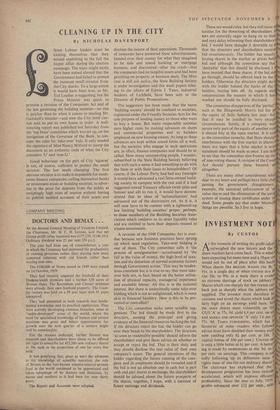CLEANING UP IN THE CITY
By NICHOLAS DAVENPORT Good behaviour on the part of City 'squares' is not, of course, sufficient to protect the small investor. The law needs changing. The first obvious revision is to make it impossible for mush- room finance companies, calling themselves banks or investment trusts or building societies, to adver- tise in the press for deposits from the public at temptingly high rates of interest without having to publish audited accounts of their assets and
disclose the nature of their operations. Thousands of innocents have answered these advertisements, handed over their money for what they imagined to be safe and sound banking or mortgage business, and discovered—after the crash—that the companies had no tangible assets and had been gambling on property or business deals. The Mias case is still sub judice, the State Building Society is under investigation and this week papers relat- ing to the affairs of Edwin J. Yates, industrial bankers of Lichfield, have been sent to the Director of Public Prosecutions.
The suggestion has been made that the name 'building society' should be confined to societies, registered under the Friendly Societies Acts for the sole purpose of lending money to those who want to buy a house. But many respectable societies earn higher rates by making advances on shops and commercial properties and to builders employed on new housing estates. As long as these advances are,kept within sound limits all is well, but the societies who engage in such operations are, in effect, finance companies and should be so called. How many unsuspecting people, I wonder, subscribed to the State Building Society believing that with such a name it had something to do with the State or with State loans to householders? Of course, if the Labour Party had had any foresight it would have advocated a real State-owned build- ing society to compete with the rest and if it had suggested retired Treasury officials (with titles and honour and all) to run it, it would have demon- strated that its ideas of 'nationalisation' had advanced out of the doctrinaire rut. As it is, it will now have to be content with a tightened-up law limiting 'building societies' proper, perhaps, to those members of the Building Societies Asso- ciation which conform to its strict liquidity rules and are entitled to have their deposits treated as trustee investments.
A revision of the 1948 Companies Act is over- due because new business practices have sprung up which need regulation. Take-over bidding is one of them. The City committee calls it 'the process of amalgamation'—accentuated by 'the fall in the value of money, the high level of taxa- tion and the distortion of normal economic factors through Government action.' This may be tenden- tious comment but it is true to say that most take- over bids are, in fact, based on the better utilisa- tion of physical capacity, managerial experience and available labour. All this is in the national interest. But there is undoubtedly some take-over bidding which is not so enlightened, which is more akin to financial banditry. How is this to be pre- vented or controlled?
The City committee make some sensible sug- gestions. The bid should be made first to the directors, naming the principal and giving evidence of the financial resources backing the bid. If the directors reject the bid, the bidder can go over their heads to the shareholders. The directors 'as soon as reasonably possible' should inform the shareholders and give them advice on whether to accept or reject the bid. That is their duty and they should disclose the real value of their own company's assets. The general intentions of the bidder regarding the future running of the com- pany and its employees should be revealed and if the bid is not an absolute one in cash but is part cash and part shares in exchange, the shareholders should be advised about the future prospects of the shares, together, I hope, with a forecast of future earnings and dividends.
These are sound rules, but they still leave 0 tunities for the thwarting of shareholders. V tors are naturally eager to hang on to their and may delay informing their shareholders 0 bid. I would have thought it desirable to e that the directors and shareholders receiv bid simultaneously. The bidder has usually buying shares in the market at prices belt, bid and although the committee say that 'desirable' that this should be disclosed I have insisted that these shares, if the bid d go through, should be offered back to the holders. Otherwise the directors might do with the bidder behind the backs of the holders, buying him off. As regards dir compensation the manner in which it has worked out should be fully disclosed.
The committee disapproves of the 'partial' _c such as the Illingworth Morris bid for p0 " the equity of Salts Saltaire last year—hot. that it may be justified in 'very exec& ,", circumstances: Surely, if a company want secure only part of the equity of another cool r1 it should buy in the open market. It is esse as the committee remarks, that there should interference with the free market in shares 0 there are signs that a false market is aris statement should be made at once. I am del to see that the committee also frowns on the of non-voting shares. A revision of the Corn Act should prevent these bastard eq altogether.
There are many other amendments which dear to my heart and perhaps have little chap' passing the government draughtsmen. example, the universal enforcement of 'no value shares and the elimination of the antic] system of issuing share certificates under try deed. Some people say that under MacrniI1) things are possible. So I live in hope.
a It
dt in bt r; de
0
D0
dir gei as So,
di 141
Cr






































 Previous page
Previous page